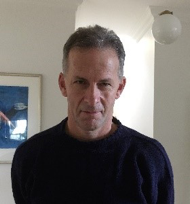Today we would like to welcome Greg Pyers to the blog. As a boy, Greg read books by Gerald Durrell; years later he worked in zoos, including Mr Durrell’s Jersey Zoo. He started writing natural history books in his zoo years and has been a full-time author for 18 years. As an avid reader of good historical fiction, and after reading the superb Wolf Hall, Greg became motivated to write in the genre himself. He found plenty of juicy subject matter in the town of Daylesford where he grew up. Complementing his writing work, he also creates gardens and enjoys observing the wildlife that comes to feed, breed and shelter within them. To date, he has written 165 non-fiction books and three novels for children. The Unfortunate Victim is his second novel for adults.
What is the inspiration for your current book?
I enjoy excellent writing, am somewhat of a history enthusiast, and, wanting to extend my own writing repertoire, decided to try my hand at a historical novel of my own. This book is my second in the genre and is based on a controversial case well suited to rendering as an entertaining read.
Is there a particular theme you are exploring in this book?
Themes of prejudice, judicial unfairness, police incompetence, and public ignorance (has some similarities to the Lindy Chamberlain case 116 years later).
Which period of history particularly interests you? Why?
Strangely perhaps, but 19th century Australia was never my most favourite period. From school days I have been interested in Republican and Imperial Rome, Ancient Greece and Middle Age Europe. However, I do have a growing interest in and knowledge of early colonial Australia and America.
What resources do you use to research your book?
Trove, various and numerous history books, and visits to historic sites.
What is more important to you: historical authenticity or accuracy?
If authenticity refers to how well a rendering of a period is done, and accuracy to the adherence to precise historical facts, the former is more important in a work of fiction. Clearly, major dates and historical figures are immutable. But what Anne Boleyn had for breakfast on March 12 1529, or what she may have actually said, is unknowable and in any case doesn’t really matter, as long as the author doesn’t feed her mangoes or put modern feminist words in her mouth (and historically accurate speech is not appropriate if it can’t be understood by a reader).
Which character in your current book is your favourite? Why?
Otto Berliner, because he is the one in whom I am most invested, the one the reader has to live with. He’s a little pompous, but he’s good at his work and doesn’t mind letting others know it (and I have no problem with that!)
Are you a ‘plotter’ or a ‘pantser’? How long does it generally take you to write a book?
Both, but more the latter. I have a good idea of where I want to go with the story from start to finish, though I can’t ever be sure how I will get there.
Which authors have influenced you?
Too many! How about: Hilary Mantel, Robert Harris, Martin Amis, Saki, Robert Gott, Shakespeare, and in my childhood: Gerald Durrell, Ivan Southall, Mark Twain, Anthony Buckeridge.
What advice would you give an aspiring author?
Read many, many books and you will see what makes good, bad and indifferent writing.
Tell us about your next book or work in progress.
Otto Berliner Investigates: By Royal Appointment
Set in 1867, Otto has his Private Inquiry Office in Melbourne and is engaged by the royal tour of Prince Alfred to sniff out Fenian threats.
Thank you for sharing your journey with us, Greg. You can find out more about and purchase Greg's books here.
Thank you for sharing your journey with us, Greg. You can find out more about and purchase Greg's books here.
Greg will be appearing in 'The Modern Voice in Historical Fiction' at HNSA 2017 on the weekend of 8-10 September 2017 in Melbourne.
HNSA 2017 is a celebration of the historical fiction
genre will showcase over 60 speakers discussing inspiration, writing craft,
research, publishing pathways and personal histories in our weekend programme.
Among the many acclaimed historical novelists participating are Kerry
Greenwood, Kate Forsyth, Deborah Challinor, Libby Hathorn, Lucy Treloar, Sophie
Masson, Sulari Gentill, Robert Gott and Arnold Zable. The HNSA’s speakers’ list is
available on the HNSA website.
In addition to the two stream weekend
programme, there will be ten craft
based super sessions and two research masterclasses. You won’t want to miss
our interactive sessions on armour and historical costumes either! Manuscript assessments will
be conducted by industry experts, Alison Arnold and Irina Dunn. Our free extended academic programme
is open for general admission but bookings are essential.
Our First Pages Pitch
Contest offers an opportunity for submissions to be read aloud to a panel
of publishers. And we are delighted to announce the introduction of our inaugural HNSA Short Story Contest
with a $500 prize!
Let’s
make a noise about historical fiction!




No comments:
Post a Comment
Note: Only a member of this blog may post a comment.